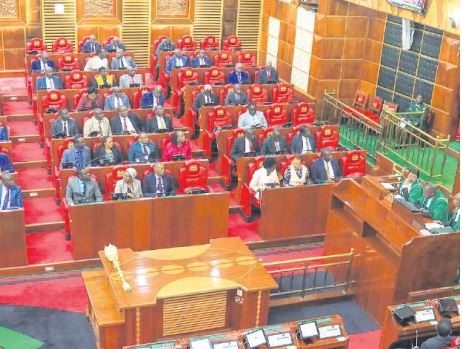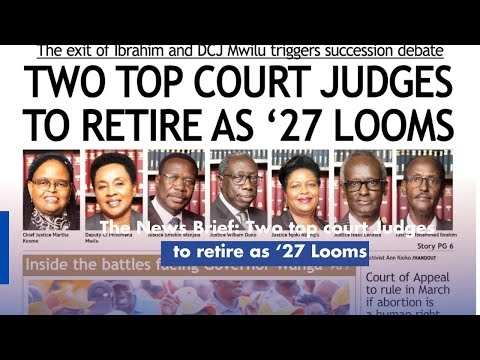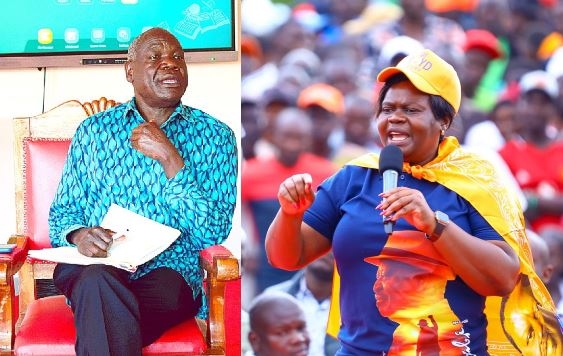
 A planery session of the National Assembly/FILE
A planery session of the National Assembly/FILE
The constitution says simply (Article 104) the electorate have the right to recall their member of Parliament or senator representing their constituency before the end of the term. However, Parliament must enact legislation providing for the grounds for recall and the procedure to be followed.
There is currently no clear procedure in law. The parliamentarians passed the Elections Act including sections that made it almost impossible to recall them. Katiba Institute sued, and the High Court declared some of those provisions unconstitutional. That was 2017. Efforts are finally under way to produce new provisions on recall.
Those Elections Act sections (partly declared unconstitutional) set out detailed rules for a recall petition. A successful petition would be followed by a recall election – the only question being “Do you want this MP/senator/MCA to lose their seat?” If enough said ‘Yes’, then there would be a by-election in which the recalled legislator could stand.
The courts’ dilemma
The previous constitution recognised people’s human rights, but also said, “The Chief Justice [CJ] may make rules with respect to the practice and procedure of the High Court in relation to [that] jurisdiction ….” No CJ did. The High Court refused to accept human rights cases. Present judges will remember how this was viewed as the Judiciary being subservient to the government. The current constitution says this must not happen again – absence of rules is not an obstacle to the right (Article 22(4)).
Now we can say that clearly the people are supposed to have the right of recall, but equally clearly it was intended to be used through law passed by Parliament. (It was perhaps a bit naïve to expect Parliament to pass law for their recall enthusiastically!)
Quite likely some case will be filed which will involve trying to convince the courts that they must not fall into the same trap as the earlier High Court, and must be prepared somehow to approve the exercise of the recall right in suitable circumstances. Otherwise the conclusion might be that Parliament strangled the right in Article 104, and the courts finished it off.
People who want to recall must give reasons, and work through a procedure that the courts can accept as fulfilling the aim of the constitution. Parliament will argue that the courts cannot invent rules that Parliament should have passed but has not.
There is of course a constitutional procedure (Article 261) to deal with Parliament’s failure to pass law as required by the constitution. They were supposed to pass this recall law within two years. But much of what they did is not now law. The Article 261 procedure is to get the High Court to order the passing of law within a reasonable time. And if they don’t, it is for the CJ to order the President to dissolve Parliament.
CJ Maraga tried this – in connection with the two-thirds gender rule. It didn’t work. So the only remedy for Parliament not passing law is likely to be ineffective – if the president is not in favour of it.
For the courts to approve a recall procedure they would have to be able to say they were interpreting the constitution, or the law. The primary question for the courts when they interpret the constitution is “What was intended by this language?”
Various issues would have to be decided.
Why?
The High Court struck out the Elections Act section that listed possible grounds. One reason was that a legislator would have had to be held responsible by the High Court under existing law before a recall petition could be prepared. This was too much to expect. Also, the underlying conduct (breach of integrity provisions of Chapter 6, mismanaging public money, or committing an election offence) might lead to loss of seat by some other means – so the Elections Act added little).
The very first draft by the Constitution of Kenya Review Commission in 2002 said that recall of an MP could be on any of these grounds:
(a). Physical or mental incapacity rendering that member incapable of performing the functions of the office; or
(c). Persistent neglect of the electorate without reasonable cause.
In evidence to the High Court, Yash Pal Ghai said that the persistent neglect provisions reflected people’s common complaints to the CKRC that MPs were around when they wanted votes, but were invisible during the term of Parliament only to reappear when they again needed votes.
Could a court be convinced that the CKRC reasons underlay the whole idea of recall and should be revived?
Another approach: some other countries have no list of grounds for recall. Could the Kenyan courts perhaps accept that, though voters should specify their reasons, it is not essential for law to restrict the possible grounds? The absence of grounds is the fault of Parliament – they have failed to make law constitutionally prescribing grounds; let them pay the price.
However, grounds that were declared inappropriate in the High Court case ought to be excluded. Being convicted of an offence and sentenced to six months or more, or being found under a law to have abused a state office or violated Article 6 – such people should automatically lose their seats under Article 99(2)(h) with 103(1)(g). Recall is not needed.
Who?
The High Court did give some guidance on who: any registered voter in the constituency should be able to participate. And even a candidate defeated in the election could initiate a petition. Indeed, it said Parliament had no power to make law on this issue restricting the right to participate in recall.
How many?
The court decision did not affect the number of signatures – so at least 30 per cent of the registered voters in the constituency must still sign. The CKRC said the same.
When?
Three years since the last election has given plenty of time for the MPs to show their worth – or the converse. However, Article 101(5) barring a by-election within three months of the next election would still apply – there is not much time.
Recall election
The High Court did not quarrel with the idea of a recall election (though you might think it adds greatly to the expense). A badly expressed rule about deciding on the outcome was unclear and unconstitutional – so the result of a recall election will depend on a simple majority of those who vote in that election.
Judicial creativity
The High Court held that Article 104 gives a right, and that right is an “important component” of the political rights in Article 38. It is therefore appropriate to remind any court facing this problem that Article 19 says that a court applying the Bill of Rights, “adopt the interpretation [presumably of the Bill of Rights and any other law affected] that most favours the enforcement of a right or fundamental freedom.”
In other words, judicial creativity is demanded and an attitude that gives priority to fulfilling rights.
Another approach?
A member who misses eight sittings without permission of the Speaker and without any explanation loses their seat. No one has ever suffered this fate. But maybe an access to information request to the Speaker about an MP might uncover something useful.
It is a bit surprising that no case challenging the effective change of party by various MPs in the last three years has reached a court hearing. Such a step should lead to loss of seat. Again an access to information request to the Speaker about why XXX is still in Parliament might have an interesting response if nothing else.

















